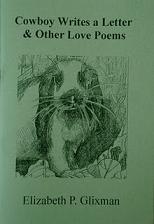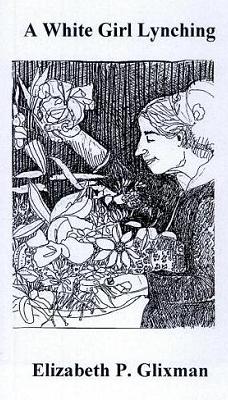Hiss Quarterly Vol. 5 ~ Issue 3
Ekphrasmagoria http://thehissquarterly.net/eck/glixman.htmlElastic Ekphrastic
Another Way Toward Poetryby Jennifer Bosveld
In ekphrasis, or ekphrastic art, there are initially two imaginations at work—that of the original artist, and that of the respondent through his/her medium.
For the purpose of this discussion we’ll primarily talk about writing poetry in response to visual art. That writing may define, redefine, or simply react to (in whatever way feels valid to the writer) the original piece of art.
Questions asked about ekphrastic poetry
What kind of art can be used for ekphrastic poetry?
You can write in response to the Springprint Company illustrated barns restaurant placemat at the greasy spoon down the street. It’s up to you. Writing poetry in response to a play, dance, movie, sculpture, oil or any other kind of painting, wood carving, you name it, can be a grand opportunity to respond with an ekphrastic poem. For ease of discussion I’ll talk about “paintings” and “drawings.”
How scholarly is your take on ekphrasis?
I haven’t a clue. I’ve studied everything I can get my hands on, and there is much disagreement in the subtleties of current use of the word and practice. I’ve decided to go with broad interpretation. There hasn’t been that much available on the subject but in the past 10 years there’s been a huge increase in interest—so much so that the words “ekphrasis” and “ekphrastic” are making their way back into dictionaries. They were gone from all but the Oxford for a very long time. This discussion is meant for the poet who wants to engage in ekphrasis and this is a subjective offering coming from my opinion which might find some disagreement elsewhere on the literary playground.
How does one approach the art
in hopes of accomplishing an ekphrastic poem in response?
Become physically comfortable and committed to a long period of time in front of the art. If possible sit in front of the work and attempt to become one with it. If you have permission, take a photograph of it and carry it with you or prop it in front of your computer, especially for the revision process. Since while writing poetry “it all depends on the questions that you ask,” ask yourself and ask the painting about the movement in the piece. What is going where? Ask about color, light, shape/form, subject/items, geometry/direction/balance, relationship/tension, taste, sound. Is anything here making noise? Is anyone/anything speaking? Can you create dialogue? Monologue? If you can’t take a photo of a museum piece, try a “naive poet’s sketch” of the piece just to remind yourself of the elements of the painting, its flow, and relationship of the subjects.
How might I choose one piece of art out of a whole gallery? Tour the gallery without pen or paper, and after a while, feel the tug toward a particular piece of art. Honor that “tug” by returning to the work and staying with it, studying it as much as possible in the short period of time you have for it. Thirty minutes? An afternoon? Then start taking notes. Is this feeling like a picture you want to further explore? Yes? Then it’s yours. Let the piece go to work on you.
There are different approaches, right? Can you simplify an explanation of that? Choose whether you wish to try the minimalist approach by saying exactly what you see there in as few words as possible (example, Cathy Callaghan’s book, Other Worlds available through Pudding House) or the embellished and flamboyant approach (example, my book, The Magic Fish) that allows you to have your way with this art without regard for the artist’s possible message.
Are there additional techniques that could
help me make a successful ekphrastic poem?
Minimize adjectives and adverbs and choose just the perfect qualifiers, not over-doing the descriptive just because you’re “interpreting” art. Tap into the senses that might be in the picture. It is easy to write what you “see” but what about smell and taste? Get all the 5 physical senses into your writing. Try a narrative, writing a story in poetry form about what you see there and beyond, starting long before the action in the painting or long past. Avoid vague language, trite notions, over-used expressions. Use strong action verbs and the finest detail regarding the nouns and even presumed proper nouns in the visual art. You may name the subjects even when the visual artist did not. Some say “art is anything you can get away with.”
How do you know you’re understanding what the artist intended?
You might not get it at all and I don’t know many artists who would care. Most professional artists I’ve known are at least amused by various interpretations of their art if not flattered or gratified by differing opinions. My recommendation is that the poet should have her way with the art and see what happens. In my work on The Magic Fish: Poems on an Edward Boccia Sketchbook, I went with immediate reactions and did not try to interpret the painting with concern for Edward Boccia’s meaning, though one can always attempt that. Perhaps occasionally I came close to his own story regarding the drawing. Boccia gave me carte blanche to have my own experience with the art. This way you have two different pieces of art, a drawing and a poem, that might meet somewhere on the spread between the two side by side, but that’s for the third pair of eyes to decide, isn’t it? For the poem to have its highest experience, we might remember that ART is always taking things and altering them. Study the picture, deconstruct it, then put it all back together again your way. It will be valid.
Are there any legal issues
when making your own art (poetry) off of another’s work?
Always include a citation regarding the art: Title, medium, year produced, artist’s name, and sometimes the owner of the piece and whether it is on loan and where you saw it exhibited. If you’d like to publish a photo of the work, you’ll have to obtain written permission from the artist and/or owner of copyright. Some artists will not give you permission. This is not legal advice, I am not a lawyer. If you are concerned, you should consult an attorney.
What is the value of ekphrastic poetry?
Exercising your pen with ekphrastic writing, when it comes down to it, is great practice for empowering your writing re: any “picture” life presents. “Get the picture?” It is great practice for poetry therapy group participants. “Taking a picture of a moment” is one of my most popular writing exercises and in my mind writing in response to a freeze-framed moment of two siblings arguing in the backyard is no different than responding to Georges Seurat’s A Sunday Afternoon on the Island of LaGrande Jatte. Ekphrastic poetry brings renewed attention to visual art. It is an excellent way to bring art ‘back from the dead’ or to just bring additional attention to worthy works, old or new. People who have trouble appreciating “modern art” (as they’ll lump it all together with this nondescriptive or incorrect label) could find an enhanced understanding of any work they spend enough time with to write a response. Ekphrastic writing can unlock the mysteries of the painting and grow an appreciation for the art and artist. It is also a way for the poet to go outside the self and respond to something outside her/his usual experience.
Are the paintings and poems supposed to interact?
If the poet wants them to. The poet may struggle to discover precisely what the artist intended, go wildly in another direction (as I often do), or anything in between. The poem might require the painting to stand beside it in order to get meaning from the poem or the poem might stand alone.
Since Ekphrasis was better known long ago,
can you tell us more about that?
Where did the term come from?
It isn’t a joke out of My Big Fat Greek Wedding, it really did come from the Greek. We know that school boys were instructed to write (usually poems) about the architecture and art in museums and grand public places—for public consumption and understanding. Around the 4th and 5th Centuries, ekphrastic poetry was pretty much limited to poems derived from visual art. The poems were often elaborate and descriptive and might have been about the religious architecture or paintings surrounding people or that the citizens had little access to. English romantic poets: (Keats “Ode on a Grecian Urn” always comes to mind first), Shelley, Byron, and others composed many such works, some of which became well known.
Can you give us an example of ekphrastic poetry collections
or resources on the subject?
ELASTIC EKPHRASTIC:
Poetry on Art / Poets on Tour
Edited by Jennifer Bosveld, with the work of poets on tour through galleries. Ekphrastic poetry has been on the rise for 15 years and is only now beginning to be understood. Here is a marvelous classroom or workshop resource for writers responding to art. Released in 2003. Perfect bound, red enamel cover, 71 pp, $14, ISBN: 1589981669.
Other ekphrastic poetry collections
and resources on the subject:
Monet in the Twentieth Century by James R. Scrimgeour (chapbook, Pudding House, 2002)
Elastic Ekphrastic: Poets on Tour through the Galleries edited by Jennifer Bosveld (chapbook anthology forthcoming from Pudding House, 2003)
Other Worlds: Poems on the Drawings of M.C. Escher by Catherine A. Callaghan (Pudding House, 1999)
The Magic Fish: Poems on an Edward Boccia Sketchbook by Jennifer Bosveld (Pudding House, 2002)
Snow Effects by Lynne Knight (Small Poetry Press, 1999)
The Gazer’s Spirit by John Hollander
Museum of Words: The Poetics of Ekphrasis From Homer to Ashberry by James A. W. Hefferman
Transforming Vision: Writers on Art ed. E. Hirsch (Art Institute of Chicago, 1994)
Paint me a poem: a canvas of words (King County Poetry & Art on Buses), 1999
Visions: paintings seen through the optic of poetry by Marc Elihu Hofstadter, Scarlet Tanager Books, 2001, 72 pages, $14. No art included but this is still another take on ekphrasis. Some might argue that most of the poems are not ekphrastic because they don’t capture the whole of the art or attempt. But the poems are elegant, very much at least a response to the art. Among experts on ekphrasis (and they are very few with a broad vision) it would be interesting to hear opinions on whether this work is ekphrastic. Regardless, I think it is splendid.
Ekphrasis, The Illusion of the Natural Sign by Murray Krieger
“Ekphrasis and the Other” by W. J. T. Mitchell in Picture Theory (University of Chicago Press), 1994
Getting the Picture: The Ekphrastic Principle in Twentieth Century Spanish Poetry by Margaret H. Persin, 1998
The Sculpted Word: Keats, Ekphrasis, and the Visual Arts by Grant F. Scott
Poetry in Crystal: Interpretation in crystal of thirty-one new poems by contemporary American poets, sponsored by Steuben Glass w/support of the Poetry Society of America (a reversal from the norm!), 1963

























